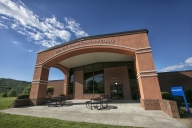You have /5 articles left.
Sign up for a free account or log in.
WASHINGTON -- College can be demanding. It’s even tougher when you can’t afford to eat.
Taylor McMahon skipped breakfast and lunch most days when she first enrolled as nursing student at Hostos Community College, which is located in New York City’s Bronx Borough. Her mother had recently been laid off, and McMahon said she had no financial support.
“It was hard to study when I wasn’t eating,” she said Monday at an event here.
McMahon’s experience is hardly unique. She was joined by two other community college students who told similar stories. All three are part of a growing group of students who go hungry, are homeless or face a range of severe financial barriers, said experts at the event, which was hosted jointly by the Association of Community College Trustees (ACCT) and Single Stop USA.
Needy students face long odds of getting to graduation. Only one in three low-income, first-generation college students earn a college credential, said Sara Goldrick-Rab, an associate professor of educational policy studies at the University of Wisconsin at Madison.
Yet many community college students fail to collect federal benefits that could help them stay in college. And even a small amount of money can make a big difference.
Elizabeth Mason, the CEO and co-founder of Single Stop, said that just $300 per student can “seismically shift retention and graduation rates.” That’s because many students face “heartbreaking choices” between buying groceries and staying in college.
Single Stop is a nonprofit group that offers a wide range of financial advising to community college students, with an eye toward unclaimed benefits. The group seeks to be comprehensive about advising in ways that are virtually impossible at cash-strapped two-year institutions, where students often face daunting bureaucracies and long waits at the financial aid office.
The event held here on Capitol Hill was a bit of a coming out party for the group. Thanks in part to alliances with ACCT and 17 community college partners, Single Stop has connected 63,000 community college students with $121 million in financial support they would not have otherwise collected. Those services included tax credits, food stamps, energy bill subsidies, financial counseling and pro-bono legal help.
The average annual income of the students Single Stop sees is $7,000. More than three-quarters are first-generation college students and fully 40 percent are parents.
Goldrick-Rab, working with two graduate students at Madison, wrote a new report about Single Stop’s model. While the study was commissioned by Single Stop and ACCT, with support from the Kresge Foundation, Goldrick-Rab said she brought a skeptical approach to the research.
“This is our work and this is what we think about this program,” she said.
Goldrick-Rab and her co-authors visited Single Stop operations at Miami Dade College, Hostos and other institutions in the City University of New York (CUNY) System. While she said more research is needed, initial findings show that Single Stop is making a substantial impact.
For example, 73 percent of CUNY students who received assistance from Single Stop re-enrolled for another year of college, she said, a rate that generally outpaces that of other lower-income student populations.
Among students who received additional financial support as a result of meeting with Single Stop advisers in 2012, the report found they received an average of $5,400.
Single Stop uses a benefits screening tool it created to help students see which government benefits they can access. The model works best, according to the report, when Single Stop is incorporated into a college campus, so its staff can include a human touch with the screening process.
One common problem area for needier students is tax preparation. The first contact between community college students and financial aid offices is often about the Free Application for Federal Student Aid (FAFSA) form. But students or their families must first file federal tax forms to be able to access the FAFSA. That can be a problem for many low-income students, who may be on their own or lack parents who file tax forms.
"Who is supposed to help you with this?” Goldrick-Rab said.
More than half of students who seek out Single Stop received free tax preparation services. For some, like Julio Cohen, the group helps students’ parents file their taxes, too. Cohen, a student at Miami Dade, said Single Stop also assisted his family in an appeal of a Medicaid rejection.
Single Stop’s overall goal is to let low-income students focus on college, in part by avoiding financial crises. To do that, the group tries to help students become self-sufficient by learning how to gain access to existing services and resources.
McMahon said Single Stop advisers helped her successfully apply for food stamps, find affordable housing and do her taxes, which in turn led to money from tax benefits that she used to buy books and a nursing uniform.
Without that extra help, McMahon said she would probably not have been able to make it to graduation last Friday, and certainly not with the 3.9 grade point average she carried to the finish line. She is the first in her family to earn a college degree.
McMahon has tried to spread the word about Single Stop to her fellow students, many of whom also go hungry and sleep in the library because they have nowhere else to go.
“I drag all my friends into the office,” she said.








